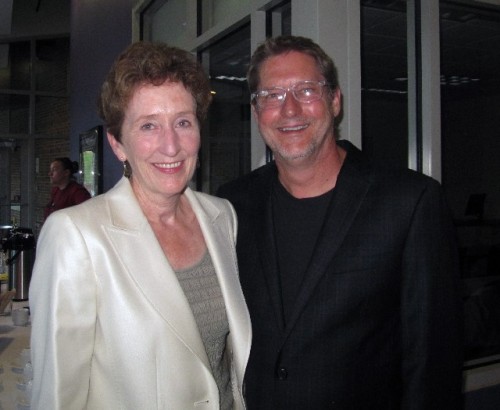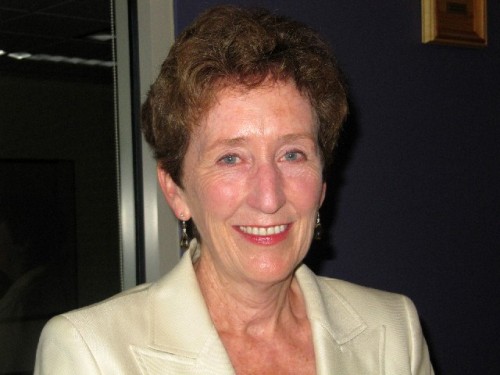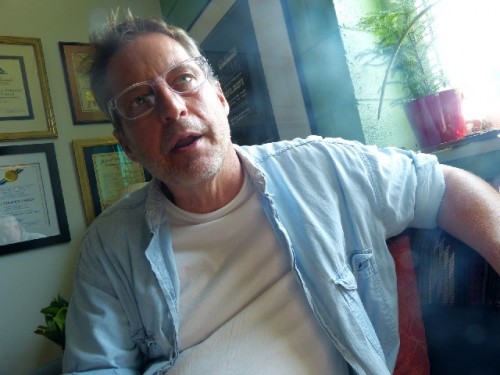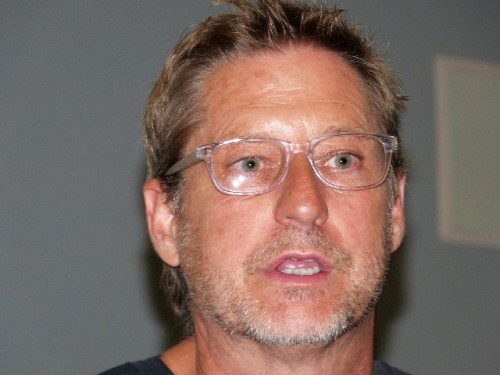Ed Herendeen on 100 New Plays in 23 Years
Taking the Fear Out of Failure at CATF
By: Charles Giuliano - Jul 31, 2013
Charles Giuliano You started with another summer program the Williamstown Theatre Festival. What are the similarities and difference?
Ed Herendeen Similar in that we both do our work on a college campus. With Williamstown their offices are located in New York City. They have an arrangement with William College to take over during the summer. That’s been long standing since Nikos (Psacharopoulos) started it.
CG They do seven productions each season and you do five. Yours are scheduled over a month so during a three day stay a visitor can see all five plays.
EH Right and everyone has to come here to live. Then everyone has to come from someplace else to see it. So that’s similar. What’s not is that we are close to a large metropolitan area. We reap the benefit that people can come for the day from Washington, D.C. or they can come for two days. We also have a very educated audience. In a survey that we took 85% have a post graduate degree. We’re tapping into the Washington/ Baltimore metro area.
CG Talk about your time at Williamstown which will be of interest to our Berkshire readers.
EH I was there in, gosh, was it ’89 and ’90? I have to check the dates but I was there for three years. The first year was with Nikos (Psacharopoulos, artistic director for 33 years) and then he died (1989). The following year there was a triumvirate of artist directors Peter Hunt, Austin Pendleton and George Morfogen. (Hunt was named Artistic Director. In 1996, long-time WTF stage manager Michael Ritchie became artistic director through 2005. Roger Reese took over for three years then Nicholas Martin from 2008-2010. This is the third season for Jenny Gersten who previously assisted Ritchie.)
I broke contract in my third year at WTF to start this festival.
We’re different also in that we only focus on new work. They do a mix of new works and classics. We are in a legal and professional partnership with Shepherd University. I don’t know what WTF’s contract is with Williams. We’re here year round supervising a theatre minor for the university, raising money, developing and planning the season. Then producing during the summer which is similar to WTF.
We have development plans to create a writing program year round in partnership with the university.
CG I reviewed Clybourne Park on Broadway. For our site we have also posted reviews of the play from Los Angeles, Boston, Indianapolis and Vermont. Barrington Stage is doing it this fall. This is the Clybourne Park syndrome. Regional theaters all over American seem to be producing the same short list of plays.
EH That’s great. They are reaching their audiences with a very important play.
CG It’s a phenomenon of American regional theatre. This short listing. Compared to which, in 23 years, you have presented a hundred new plays. What is the necessity of that?
EH My passion is to direct new work. I learned that in graduate school at Ohio University. George Sherman was my mentor/ director. In our second year he required us to work with a living playwright in the MFA program. Three of us had to work with one of the playwrights. When I had that experience, and I was in the room with the playwright, I knew that any opportunity I would get to do that would be very exciting. I’ve always had that passion to direct new work.
Here, as I’ve said, we define new work in many different ways. We wouldn’t do a Clybourne Park because it’s had its development. It’s had its first and second production. Even with a third production, if the writer is still working on a play, that’ great. Or if it’s not being done anywhere else I would be interested. I saw the Broadway production at Playwright’s Horizon. If it wasn’t picked up in the D.C. area, it was by Woolly Mammoth Theatre, I would have jumped on it in a minute. It’s a play that I’m quite attracted to. But it’s being done and people have an opportunity to see it.
I will take a second production. Nobody’s jumped on (Sam Shepard’s) Heartless yet. I happen to think it’s a very important play and a play I’m attracted to. It’s a play I think our audiences are responding to.
Modern Terrorism was a play I actually had before the New York Opening. I was quite interested and didn’t get on it fast enough. We’re reaping the rewards that he has a shot at it and then went back in and started working on it. I believe that he’s going to continue to work on it. So I think of Modern Terrorism, which was only done in the fall, as a very new and still developing play.
Scott and Hem is a play I commissioned on an idea. It will go to Barrington Stage based on an agreement we made with Julianne Boyd. We were willing to say you can have the Rolling World Premiere because all we’re…
CG Rolling world premiere?
EH That’s what she wanted. She wouldn’t do it unless it had the words Rolling World Premiere. Frankly the words World Premiere mean nothing to me. It’s bullshit. If she needs it to sell tickets. My audience comes to see new plays. They don’t care if it’s a world premiere or what. But that’s very important to her to have the words World Premiere. We don’t have World Premiereitis. All I cared about was Mark (St. Germain) getting another shot at this. If she wouldn’t do the play because she couldn’t call it world premiere then let’s come up with some creative language.
CG It seems that it’s easier to get a first production than a second one.
EH You hear that a lot. A lot of theatres want to do the world premiere. Then they won’t do it if you’ve already done it. So I’m happy to let people do the second production.
CG If you don’t make it on the first shot…
EH Which is crazy. We both know that it takes several productions before a play is finished. Especially a play that’s commissioned. This is the first audience to ever hear Scott and Hem. I can only imagine that he will do work between when he left last week and Barrington when it starts rehearsals. He will learn from the Barrington experience. I have high hopes that this play has a long life. And that it will continue to get work until it gets its New York or big regional production.
CG Last Fall on Broadway we saw David Mamet’s The Anarchist.
EH They sent me the script and wanted me to do it. Jeffrey Richards wanted me to do it.
CG It got trashed. It bombed on Broadway and critics hated it. Did you see it?
EH I read it.
CG There were problems. It was an intimate play that never should have been on Broadway. It would have done much better in a smaller house. I came from that radical background in the 1960s as a Brandeis graduate. I totally understood and appreciated the context of the play. I knew Angela Davis
EH I hired her niece.
CG While dead on Broadway that strikes me as a play that would do well in regional theatres.
EH Right. It’s a shame.
CG Would you consider taking a play like that?
EH I did consider it. There were other plays I was interested in doing. I have five slots and they all have to fit together. Our mandate is that the writers who come here leave with a better script. We hope that Mark has benefited from a full production with these actors.
CG In terms of new plays there seem to be a number with a single actor, two or three. The Anarchist, for example, had two actors (Debra Winger and Patti LuPone) and a very simple set. That would seem to be a compelling and affordable production for regional theatres. Is that a paradigm of how new plays are being written and produced?
EH We’ve done shows with larger casts from five to six characters. We did The Overwhelming (2008) by J.T. Rogers which had a large cast. Economics will determine how many equity actors you can use. This year I budgeted 16 equity contracts for five plays. The actors who play Scott and Hem play two Puritans in Discourse. The characters of Abigail and Mercy in Discourse are Sally and The Nurse in Shepard’s Heartless. We are committed to repertory. You’re going to see all five plays this week. Every two days you can see all five. You will see Joey Collins as Fitzgerald and as A Puritan. On Saturdays he’ll have a matinee as Fitzgerald and be in Discourse that evening. In rehearsals they have four hours on one play and four hours on the other. That’s true rep.
CG There have been a number of opinions that it was not a great season on Broadway. Also we have the phenomenon of regional theatre not taking chances with new work. They seem to program what they think the audience wants to see. Can you comment on the current state of American theatre.
EH I’m so immersed in this theatre that I think American theatre persists because of new plays. I am passionate that new plays are produced without a production history. There’s nothing to fall back on. New plays are presented without a safety net.
I understand the economics of a large regional theatre producing Clybourne Park because it has a production history and it has a safety net as it has pull quotes from positive reviews. If you do Cat on a Hot Tin Roof or Streetcar Named Desire there’s a production history there. Those are good plays worth seeing.
What’s important about what we’re trying to do, and other theatres committed to new work, is that we produce without that safety net. We’re giving birth and instigating, as is the case with Mark’s Play and Jane Martin’s play (H2O) we’re actually instigating the creation of that new work.
Maybe our $10,000 helped to make that play happen. Now rather than later. In the case of Jon Kern and Modern Terrorism we are giving him the opportunity to work on a play that was recently done.
In many ways, I hope, we’re contributing to the future of literature for the stage.
Does that mean that all five of these plays will make it around the regions like Clybourne Park does? Will they get New York openings? I never know the answer to that. I hope there is an audience for these plays and that they have a life beyond Shepherdstown. That’s always the hope.
CG What’s the attention span for what you are doing from the theatre community? Do artistic directors come to see the plays? Are they cherry picking your productions.
EH Yes. There are people coming down to see them. There have been people already and more producers coming to see plays. They’re coming this week and next week. We do our best to try to invite people to see the plays.
We know that Mark St. Germain’s play already has a home in another month (Barrington Stage Company). They will be in rehearsal again and I’m thrilled with that. I also have faith that with his reputation and the subject matter this play will have a life.
CG Is anything in the works for the other four plays?
EH Yes a lot that I can’t reveal. We are hearing and having conversation that there is tremendous interest in H2O. There’s good buzz. So that we are quoted correctly there’s a lot of buzz about H2O in the theatre community.
CG Do some plays bomb here?
EH We don’t even know what that word means. If you ask Mark “Why do you choose Shepherdstown to do your work?” I think we provide a safety net for the writer.
At our theatre festival we take the fear out of failure.
CG Have you said that before? Is it your mantra?
EH It’s my mantra to the company. This is the place for you to take your chances. Because, what happened to The Anarchist, will not happen here. Not being looked at as an opening that will make or break a play. You can write the play you want to write here.
I don’t know what bombing means but you will play to pretty much full houses. We play to full houses then stop. We could keep going. H2O is totally sold out for the run. I think we have just seven tickets left. We could extend it if we had that ability.
But how do you define a hit in a non profit theatre? We close it.
So that lingo, bombing, personally, is a bad word for a new play. New plays deserve more nuturing.
CG Nuked?
EH No, nurturing. So when you hear “That play’s a dog” or “Bombed” what does that mean?
CG How does it feel have 75 critics and guests visiting? (ATCA conference)
EH I think it’s great. Whatever you say about us is going to bring us more attention. We have a really great story to tell. So we are delighted to have you here. However you tell the story it’s a story that’s going to resonate.
CG It’s nice to feel welcomed and appreciated.
EH We welcome anyone who comes and sits in our chairs. We especially welcome people who are story tellers. Nothing will make me happier than that some of those people you said were offended (by Modern Terrorism) will talk about it. That will only bring me better plays.
CG Taking a straw poll it could be a better play. It could have been directed more sharply. There could be more character development. I would like to know more about the motivation of why this kid is willing to blow himself to Kingdom Come. We assume that we know why because we have read so much media and background on these terrorists. But it seems that in the play there is a lot of Morse Code going on rather than in depth character development.
Chatting here with colleagues, however, they see things in the plays that I do not. Attending an ATCA conference there is a remarkable critical mass of knowledge about contemporary theatre. I learn that there are many details that I completely miss or simply get wrong.
There is an amazing spectrum of opinions, from those who say that they enjoyed the play and thought it was funny, to those who say that I only laughed three times all night. To individuals saying I’m deeply offended how could they do that?
EH I love it. That tells me something good is going on.
We provide a lot of opportunities for our audiences to discuss these plays. What I want to call conversations. The biggest segment of our audience see all five plays.
It’s not like Humana where we all go to shop. (ATCA will hold a conference next year at the 38th Humana Festival of New American Plays, in Louisville, February 26 – April 6, 2014) People come to see five new plays. They are immersed in plays that all have been pretty much written within the last year.
So they’re getting a snapshot of the American landscape within the last year. I think it’s terrific that they (critics) want to talk about it. Theatre creates a forum for living conversation. In some cases, with the living playwright.
CG Last week during interviews at the Williamstown Theatre Festival I was talking with the writer of Johnny Baseball.
EH Richard Dresser. We’re done five of his plays. Johnny Baseball started at ART.
CG I asked him about the relationship between a playwright and the critics. He told me about a play he did in St. Louis. There was a critic from the New York Times who wrote a positive review. When the production moved to New York the same critic panned the show.
EH That play was Rounding Third which we did here.
CG Do you get a pass being in West Virgina?
EH Again I don’t get that lingo, a pass?
CG Is there a difference in being out of a major urban center?
EH We choose to be out of a major urban center.
CG If New York, Chicago, Los Angeles are hardball what’s this?
EH That’s not why I’m doing theatre. What does hardball mean?
CG Chin music. High inside heat.
EH We’re not a commercial theatre. We don’t have to worry about filling seats with reviews. This will sound awful.
CG Please.
EH We’re pretty much review proof.
CG So you don’t give a fuck what we think.
EH I do. But in terms of commercial it’s not impacting our ticket sales. Actually, a play that is controversial might actually have a positive impact on our ticket sales. That’s great. If we’re looking at Hardball as commercial success that’s not our mission. Our mission is to produce and develop these plays. Let them breathe and go somewhere hopefully. Out of a hundred (in 23 years) we can’t predict which ones will do that.
CG Who is evaluating you? At the end of a season who do you report to in terms of was it a good or bad program? Is that your board? The President of (Shepherd) University?
EH Not that I know of. I guess I would be my own worst judge. If there weren’t people sitting in the seats and we were running up the budget, running deficits and going into debt. Our board is fiscally responsible for the festival.
CG Twenty three years is a long run for an artistic director. That seems to be the case with founders of companies. Williamstown, for example, is on its fourth artistic director in the past ten years.
EH Yes but Nikos ran it for 33 years. If you look at other founders. That’s actually making me think. I want to investigate the word founder. That would be a great story. To look at the founders of some theatres. Joe Papp (June 22, 1921 – October 31, 1991 founder of Public Theatre). William Ball (April 29, 1931 – July, 30 1991) was an American stage director and founder of the American Conservatory Theatre.
Look at people who started something with a particular vision for theatre. When Bill Ball started ATC he had a very specific vision for that. It’s a great theatre but where have people taken it? (Sir) Tyrone Guthrie -July 2, 1900 – May 15, 1971- (founder of the Stratford Festival of Canada, the Guthrie Theater in Minneapolis, Minnesota and the Tyrone Guthrie Centre, at his family's ancestral home, Annaghmakerrig, near Newbliss in County Monaghan, Ireland.) Margo Jones (December 12, 1911 – July 26, 1955 who launched the American regional theater movement and introduced the theater-in-the-round concept in Dallas, Texas. In 1947, she established the first regional professional company when she opened Theatre ’47 in Dallas. Of the 85 plays Jones staged during her Dallas career, 57 were new, and one-third of those new plays had a continued life on stage, television and radio.) Bob Brustein and A.R.T. He started with Yale Rep and actually got fired from Yale (before moving to Harvard’s Loeb Drama Center).
That would be an interesting thing to look at.
I started this out of a passion to do new work. It was an opportunity to do new work outside of the urban glare. I don’t have the concerns of my colleagues in regional theaters who have to fill more seats. It came at the right time. We came here when the then president of the college was interested in starting an equity theatre during the summer. He saw the proximity of urban centers (Baltimore and Washington, D.C.) and the advantages of culture. We don’t have a training program but theatre is an important part of our education especially as an undergraduate. Theatre on college campuses is important. He saw that and wanted to up the stakes by making it an equity theatre. That’s how I came into the picture. But I convinced him to make it an equity theatre to do new plays. Thus the vision of contemporary theatre outside the urban glare.
CG How does the college benefit?
EH Students get to intern. Stories are being written about this festival for the past 23 years that the college didn’t reach before. It brings attention and publicity. But mostly that we are creating new literature and where else but at the academy? Where else can you be allowed to fail than at the academy? Which is why it is a great partnership for new play development to be in an academic setting. With no strings attached. Because we have the ability to try something. We take the fear out of failure by creating such joy in the creative process.





